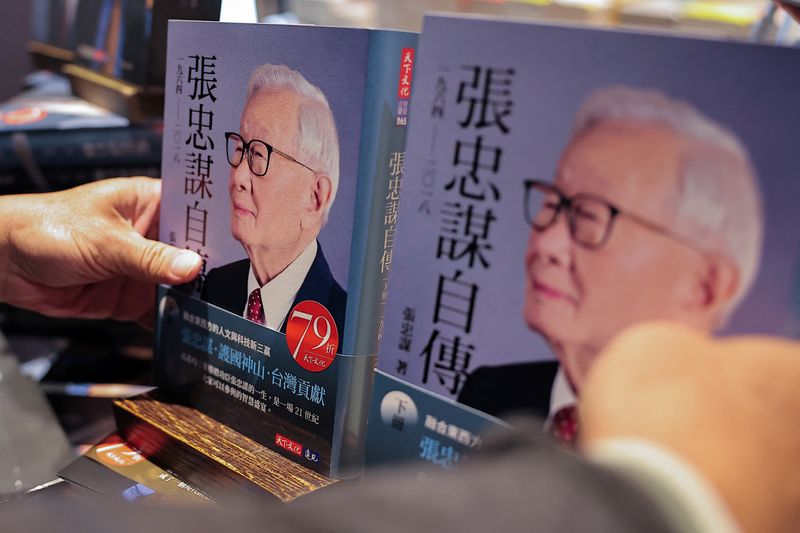By Wen-Yee Lee
TAIPEI (Reuters) - TSMC's founder Morris Chang asked Nvidia's Jensen Huang to consider becoming the chief executive of the Taiwanese chip giant more than a decade ago, but was turned down in just 10 minutes, Chang says in a new volume of autobiography.
Huang, who has served as chief executive of the AI chipmaker since founding the company, told Chang, "I already have a job," the 93-year-old recounted in the memoir, published on Friday, that recounts his life from 1964 to 2018.
The second volume of Chang's autobiography covers his 25 years at Texas Instruments (NASDAQ:TXN) and the founding of TSMC in 1987, after the first, about his early life, was published in 1998.
The new volume recounts some of TSMC's dealings with major customers such as Apple (NASDAQ:AAPL) and Qualcomm (NASDAQ:QCOM), as well as how Intel (NASDAQ:INTC) turned down an invitation to invest in TSMC in the 1980s before becoming a key customer.
Chang also describes his friendship of more than two decades with Huang, who has turned California-based Nvidia into one of the world's most valuable companies amid a surge of interest in artificial intelligence.
The two men have regularly praised each other in public over the years, with Huang crediting Chang for Nvidia's success.
In the book, Chang said that while searching for a successor in 2013, he viewed Huang as an ideal candidate because of his character, professional experience, and semiconductor expertise.
"I spent about 10 minutes concisely explaining my deep expectations for TSMC," Chang recalled. He said Huang listened patiently but responded, "I already have a job."
A few weeks later, Chang tried again, but Huang was resolute.
"Jensen’s response to me was honest: He 'already had a job!' That job was to elevate Nvidia to what it is today, 11 years later," wrote Chang.
Nvidia did not immediately respond to a request for comment on Chang's book.
Chang added that when Huang was selecting a manufacturing partner for Nvidia, he was willing to bet everything on TSMC.
For its part, TSMC sent two production staff to help Nvidia in 1998 when the up-and-coming firm was short-staffed.
Chang also wrote that he approached Gordon Moore, then CEO of Intel, when he was raising funds for TSMC in the 1980s.
The U.S. chipmaker did not invest, but later became one of TSMC’s customers, contracting to make its latest laptop chips.
Chang said Intel CEO Pat Gelsigner had since 2021 set his sights on turning the company into a foundry player.
While he wished the effort luck, Chang said Intel's long-standing business model, focusing on the in-house production of its own chip products, could make such a move hard, given foundries makes chips designed by other companies.

Intel did not immediately respond to a request for comment.
(This story has been refiled to change 'upcoming' to 'up-and-coming' in paragraph 13)
